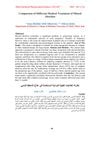 June 2024 in “Benha Journal of Applied Sciences”
June 2024 in “Benha Journal of Applied Sciences” Serum IMA levels may be linked to premature hair graying and erectile dysfunction.
 June 2024 in “Archives of dermatological research”
June 2024 in “Archives of dermatological research” Dietary supplements might help prevent post-COVID hair loss, but serum ferritin is not a reliable indicator.
 June 2024 in “Research Square (Research Square)”
June 2024 in “Research Square (Research Square)” Copper deficiency is linked to post-COVID-19 hair loss in women.
 May 2024 in “World Journal Of Advanced Research and Reviews”
May 2024 in “World Journal Of Advanced Research and Reviews” Low iron levels are strongly linked to chronic hair loss in women.
 May 2024 in “International journal of research in dermatology”
May 2024 in “International journal of research in dermatology” Low vitamin D levels are linked to increased risk of male pattern baldness.
 April 2024 in “Proceedings”
April 2024 in “Proceedings” People with alopecia areata often have lower iron levels than healthy people.
 March 2024 in “Portuguese Journal of Dermatology and Venereology”
March 2024 in “Portuguese Journal of Dermatology and Venereology” People with hair loss often have lower levels of iron, vitamin D, and vitamin B12.
 February 2024 in “Skin Research and Technology”
February 2024 in “Skin Research and Technology” Microneedle therapy combined with serum effectively increases hair count in people with hair loss, with no side effects.
 February 2024 in “Heliyon”
February 2024 in “Heliyon” People with androgenetic alopecia have different lipid levels in their blood, which vary between men and women, and may be linked to a higher risk of metabolic syndrome.
 January 2024 in “Journal of the Endocrine Society”
January 2024 in “Journal of the Endocrine Society” The research found that measuring androgens in urine can give extra information about body metabolism and is linked to androgen levels in the blood, especially in young girls.
 January 2024 in “The Egyptian Journal of Hospital Medicine (Print)”
January 2024 in “The Egyptian Journal of Hospital Medicine (Print)” Zinc levels are not directly linked to pattern hair loss.
 January 2024 in “The Egyptian Journal of Hospital Medicine”
January 2024 in “The Egyptian Journal of Hospital Medicine” Men with male pattern baldness have higher levels of A-FABP, which might help in early detection.
 November 2023 in “Journal of Cosmetic Dermatology”
November 2023 in “Journal of Cosmetic Dermatology” People with non-scarring hair loss often have lower vitamin D levels than those without hair loss.
 November 2023 in “International Journal of Trichology”
November 2023 in “International Journal of Trichology” No significant link between hair loss and iron or thyroid levels was found, but checking for deficiencies might still be useful.
 October 2023 in “The Journal of urology/The journal of urology”
October 2023 in “The Journal of urology/The journal of urology” Higher testosterone and DHT levels are not linked to urinary symptoms in men.
 October 2023 in “Acta dermato-venereologica (Print)”
October 2023 in “Acta dermato-venereologica (Print)” People with severe hair loss have lower zinc levels in their blood.
 October 2023 in “Benha Journal of Applied Sciences”
October 2023 in “Benha Journal of Applied Sciences” Serum clusterin may play a key role in the inflammation and immune response in post-adolescent acne.
September 2023 in “Diagnostics” Low vitamin D levels may affect ovulation and progesterone in infertile women.
 September 2023 in “Clinical, Cosmetic and Investigational Dermatology”
September 2023 in “Clinical, Cosmetic and Investigational Dermatology” Higher SHBG levels are linked to less severe hair loss in women, but vitamin D levels don't seem to affect hair loss.
 August 2023 in “International journal of basic and clinical pharmacology”
August 2023 in “International journal of basic and clinical pharmacology” Herbal hair serum promotes natural hair growth and maintains healthy hair.
 June 2023 in “Benha Journal of Applied Sciences”
June 2023 in “Benha Journal of Applied Sciences” Targeting IL-17 could help treat pattern hair loss.
 June 2023 in “Benha Journal of Applied Sciences”
June 2023 in “Benha Journal of Applied Sciences” People with chronic hair shedding have lower antioxidant levels in their blood compared to healthy individuals.
 June 2023 in “Annals of the College of Medecine”
June 2023 in “Annals of the College of Medecine” Low iron levels are linked to more hair loss in women with chronic hair shedding.
May 2023 in “GLOBAL JOURNAL FOR RESEARCH ANALYSIS” Early onset hair loss is linked to low vitamin D, but severity isn't related to vitamin D levels.
 April 2023 in “Tikrit Journal of Pharmaceutical Sciences”
April 2023 in “Tikrit Journal of Pharmaceutical Sciences” Deferasirox effectively reduces iron overload in ß-thalassemia patients but may cause some manageable side effects.
 April 2023 in “Dohuk medical journal”
April 2023 in “Dohuk medical journal” People with telogen effluvium often have much lower vitamin D levels than healthy individuals.
 February 2023 in “Benha Journal of Applied Sciences”
February 2023 in “Benha Journal of Applied Sciences” People with Telogen Effluvium have similar zinc levels in their blood as healthy individuals.
 January 2023 in “International journal of clinical medicine”
January 2023 in “International journal of clinical medicine” Women with PCOS and hair loss have lower levels of the protein gelsolin in their blood.
 December 2022 in “Cureus”
December 2022 in “Cureus” Low iron levels are linked to hair loss in women.
 November 2022 in “SAS journal of medicine”
November 2022 in “SAS journal of medicine” There's no link between low iron levels and the hair loss condition, alopecia areata.




























